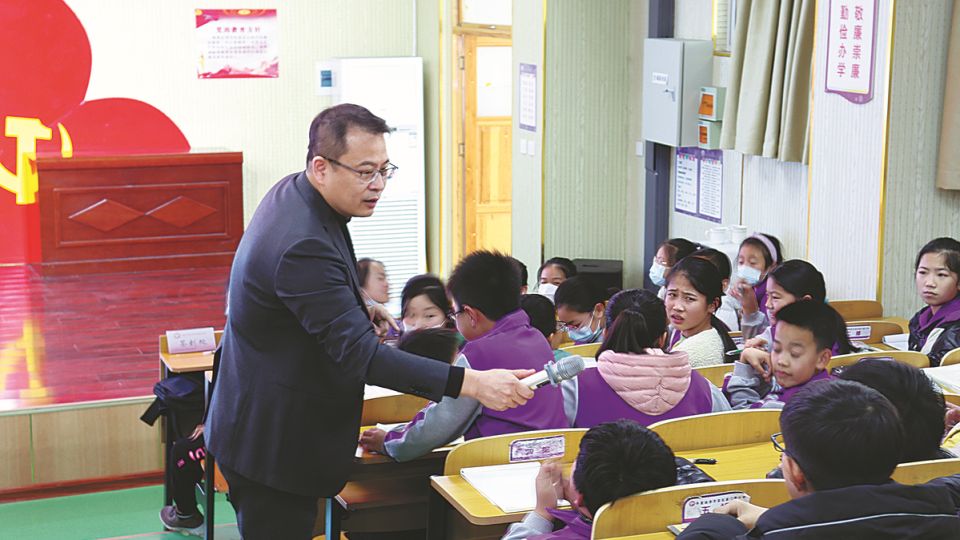February 4, 2022
QINGDAO – Shao Shougang is a lawyer based in Qingdao, East China’s Shandong province, who focuses on offering legal counsel for companies. The 48-year-old is better known to the public, however, for his efforts to address the issue of student bullying.
Practicing at a branch of a law firm headquartered in Beijing, Shao turned the telephone in his office into a hotline in January 2019 to provide free advice for elementary and high school students being bullied by their peers.
Over more than two years, “at least 100” calls by students and their parents from “all around the country” have come in asking for help, the lawyer says, adding that some of them called him directly on his cellphone.
Before training and recruiting a volunteer to take on the job in November, Shao and his colleagues would keep a record of the calls, assess the information the callers provided and provide assistance accordingly.
For some children who suffered bullying but dared not tell their parents or teachers, Shao says he would encourage them to overcome their fears of the bullies and seek help.
For parents who called, he would introduce them to the anti-bullying stipulations in laws and regulations to help them better protect their children’s rights, and would always suggest parents seek professional and timely psychological intervention for their children.
“We have found that bullying may not always leave physical injuries, but it almost always causes mental wounds,” says the lawyer, who also helps mediate bullying cases in schools in Qingdao.
Peer bullying is prevalent all around the world.
In a report on school violence and bullying published in 2019 which gathers data from surveys that “cover 144 countries and territories”, the United Nations Educational, Scientific and Cultural Organization said that “almost one in three students … has been bullied by their peers at school at least once in the last month”.
In order to better tackle the issue, the Standing Committee of the National People’s Congress, China’s top legislature, adopted the amendments of the Law on Protection of Minors and of the Law on the Prevention of Juvenile Delinquency in late 2020, which ask schools or educational authorities to set up a system to prevent and control student bullying.
The amendment of the Law on Protection of Minors defines student bullying as “the behavior happening among students, where one party deliberately or maliciously bullies or insults the other party through body, language, network and other means, causing personal injury, property loss or mental damage to the other party”.
The amendment also asks schools to stop any bullying behavior immediately and inform parents or other guardians and calls on both sides to participate in identifying and handling bullying, among other things.
The amendment is “a breakthrough” as it encourages parents of both sides to participate in the response to the bullying and makes it more difficult for schools to trivialize the issue, Shao says.
Looking back on the cases that his team has handled through the phone calls, the lawyer said he identified “more than 90 percent” of them as student bullying.
Most of the cases involved physical bullying, which often took place in a repeated manner outside the scope of video surveillance, such as in a dorm or washroom, this could lead to the victims exhibiting stress responses, such as insomnia, fever and even depression, he says.
Also not to be ignored is the risks of bullying turning into severe conflicts, leading to crimes being conducted by the bullies or those being bullied, says Shao, pointing out that preventing bullying is an important way to prevent juvenile delinquency.
Schools are where most of student bullying cases take place. As a result, schools should create a friendly and caring environment for children, and teachers should take the lead by taking special anti-bullying training, treating every student fairly and avoiding marginalizing any of them, Shao says.
He also suggests schools encourage students to report bullying and conduct serious investigation into any reports of bullying.
Shao and his team published a book in 2019 that provides advice for schools and parents on how to deal with student bullying.
In December 2019, the Beijing headquarters of his firm co-launched an anti-bullying program with the China Children and Teenagers’ Fund.
The program aims at providing anti-bullying training to schools, communities and families, legal support for bullied children, psychological counseling to the bullied, among other things.
The aim is to cover as many as 1,000 elementary and high schools in China, according to the Fund.


